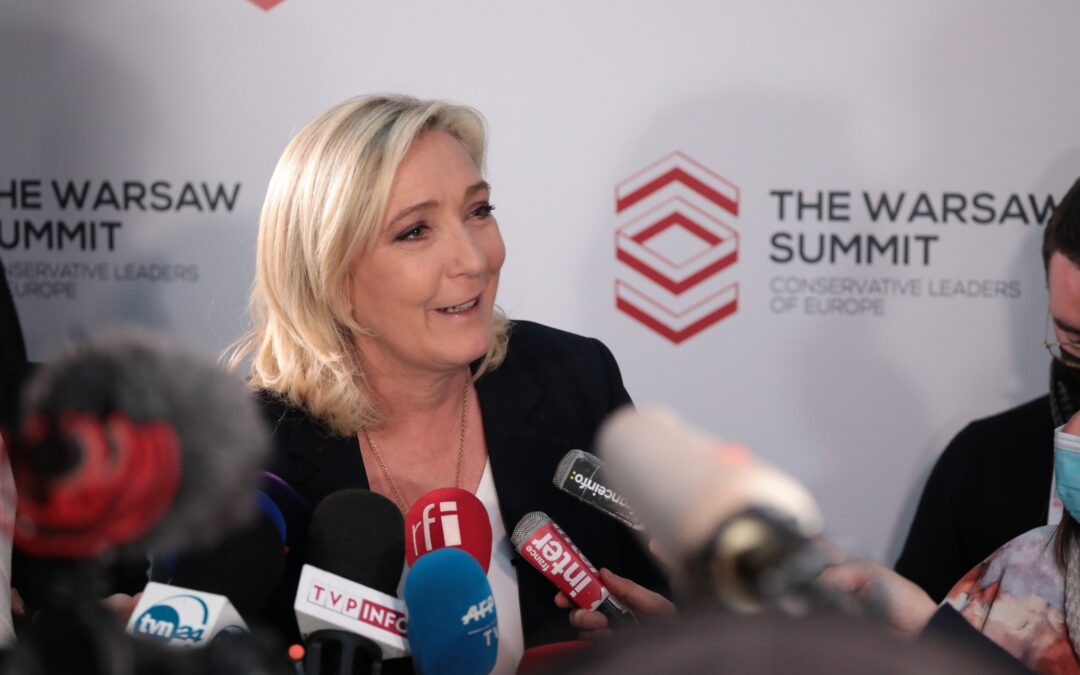Opposition leader Donald Tusk has accused Poland’s ruling Law and Justice (PiS) party of “treason” for hosting a summit of European right-wing and far-right leaders who hold pro-Russian positions.
Marine Le Pen and Viktor Orbán were among those who gathered in Warsaw on Saturday at the invitation of PiS, whose chairman, Jarosław Kaczyński, called for great “cooperation, coordination and unity” between the participants.
The event aroused particular controversy in Poland because of the pro-Russian stance of many participants. Distrust of Russia is high among Poles, and PiS often presents a strongly anti-Russian line. As recently as 2019, Kaczyński rejected the idea of working with Le Pen due to her “obvious links to Moscow”.
While in Warsaw at the weekend, Le Pen gave an interview to the Rzeczpospolita daily in which she declared that “Ukraine belongs to Russia’s sphere of influence”.
She blamed current tensions relating to Ukraine on “attempts to violate that sphere of influence” and called on people to “fight the real threat that looms over Europe: Islam”.
It is a sign of how isolated Poland is in Europe (thanks to PiS) that the ruling party is flirting with "allies" like this – i.e. forces whose vision for Europe is entirely at odds with Poland's interests and PiS's own policies. Le Pen was once far beyond the pale for Kaczyński.
— Stanley Bill (@StanleySBill) December 6, 2021
Speaking to Gazeta Wyborcza yesterday, Tusk said that PiS’s decision to “organise this coven of anti-Ukrainian and pro-Russian politicians – at a time when people are talking about whether Russia will invade Ukraine – is national treason”.
Ahead of his meeting with Vladimir Putin yesterday to discuss the Russian military build-up on Ukraine’s border, Joe Biden consulted with Emmanuel Macron, Angela Merkel, Mario Draghi and Boris Johnson, but did not speak to Poland’s president or prime minister.
“A few years ago, everyone would ask Poland about what is happening in Ukraine,” said Tusk, who leads Civic Platform (PO), Poland’s largest opposition party, and served as prime minister between 2007 and 2014. “[Now] the world does not listen to what Poland has to say about Ukraine.”
In response to criticism that they are cooperating with pro-Russian parties, senior figures from PiS have pointed out that the Polish opposition’s allies elsewhere in Europe have also pursued policies beneficial to Russia.
In particular, they note that the Nord Stream pipelines bringing gas from Russia to Germany – which the PiS government has strongly opposed – were constructed under the chancellorship of Angela Merkel, an ally of Tusk and PO.
Poland’s prime minister, Mateusz Morawiecki, responded to Le Pen’s remarks about Ukraine by saying that he was “not surprised if someone from the West does not know the specificities of the East”. He added that his party “does not have to agree on everything” with its allies.
“We can differ in many matters, but at the same time we must have an alliance of parties that want a strong European Union of strong states,” said Morawiecki, quoted by Rzeczpospolita.
His current position – like that of Kaczyński – marks a change from the recent past. Two years ago, Morawiecki said that PiS would “rule out an alliance with any [European] faction that had France’s National Front [the former name of Le Pen’s party] as a member”.
This year, however, the ruling party has grown closer to Le Pen. Morawiecki himself met her during a recent visit to Brussels, after which the French far-right leader declared that the two “share many points in common”.
Main image credit: Slawomir Kaminski / Agencja Wyborcza.pl

Daniel Tilles is editor-in-chief of Notes from Poland. He has written on Polish affairs for a wide range of publications, including Foreign Policy, POLITICO Europe, EUobserver and Dziennik Gazeta Prawna.




















